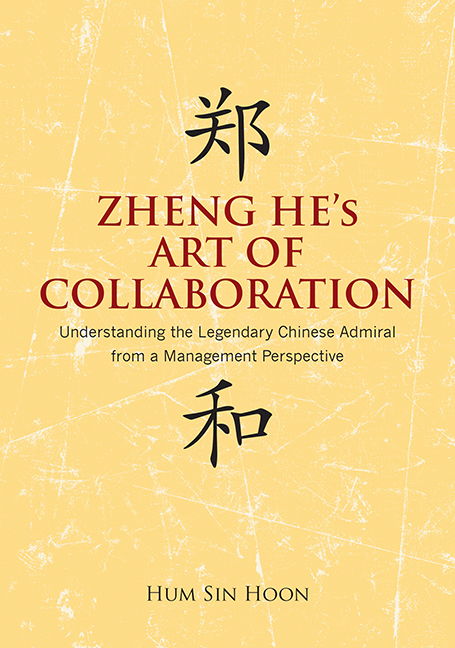 Zheng He's Art of Collaboration
Zheng He's Art of Collaboration Book contents
- Frontmatter
- Contents
- Foreword by Tan Ta Sen
- Message by Wong Ah Long
- Preface
- Acknowledgements
- PART I ZHENG HE AND HIS MESSAGE
- PART II ZHENG HE AND HIS MANAGEMENT
- Chapter 5 Learning from Zheng He
- Chapter 6 Learning from Zheng He
- Chapter 7 Learning from Zheng He
- Chapter 8 Zheng He and His Faith
- Index
- About the Author
Chapter 6 - Learning from Zheng He
Human Resource Management Practices
from PART II - ZHENG HE AND HIS MANAGEMENT
Published online by Cambridge University Press: 21 October 2015
- Frontmatter
- Contents
- Foreword by Tan Ta Sen
- Message by Wong Ah Long
- Preface
- Acknowledgements
- PART I ZHENG HE AND HIS MESSAGE
- PART II ZHENG HE AND HIS MANAGEMENT
- Chapter 5 Learning from Zheng He
- Chapter 6 Learning from Zheng He
- Chapter 7 Learning from Zheng He
- Chapter 8 Zheng He and His Faith
- Index
- About the Author
Summary
INTRODUCTION
Zheng He's grand voyages have been associated with two unprecedented, large-scale characteristics: a huge fleet of 200–300 ships, with the largest treasure ships measuring some 480ft by 194ft and the medium-sized ones measuring about 399ft by 162ft;1 and a large crew of more than 27,000 men.2 In putting together this large number of people, and in managing them throughout the voyages, Zheng He must have had much experience in Human Resource (HR) management practices that today's managers and leaders can learn from.
In fact, as a land-based army man rather than being a navy commander before he was appointed by the emperor to lead the grand voyages, Zheng He must have had the acute sense that without access to highly skilled maritime-oriented human capital, it would have been impossible for him to embark on his grand voyages, much less to achieve any degree of notable success. What were the major HR management tasks that Zheng He considered to be most important and which he apparently paid special attention to in terms of planning and execution? What can we learn from Zheng He about his people skills and HR management practices that can be of relevance to us today? How did he manage his leadership team and crew to ensure that they stayed united while travelling to distant shores and peoples?
Indeed, when we ponder over these questions, and as we grapple with the sheer size of his huge crew of more than 27,000 men, we must conclude first and foremost that Zheng He saw his human resource as a very vital asset for carrying out his emperordecreed voyages and mission. It would require much boldness on his part to decide on the need for such a large crew if he did not see it as mission-critical.
Similarly, it should also be apparent that Zheng He would have to consider how he would organize and structure his huge HR asset base so as to efficiently and effectively operationalize his mission. And given the open seas as the working environment for his crew, and with each voyage's duration of 1.5–2 years, it should also be obvious that Zheng He must figure out how to manage his HR in terms of meeting their needs and keeping them motivated.
- Type
- Chapter
- Information
- Zheng He's Art of CollaborationUnderstanding the Legendary Chinese Admiral from a Management Perspective, pp. 171 - 193Publisher: ISEAS–Yusof Ishak InstitutePrint publication year: 2011


